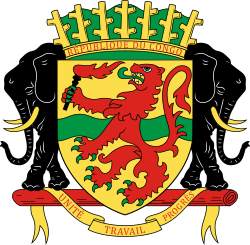| | |||||||||||||||||||||||||||||||||||||||||||||||||||||||||||||||||
20 August 2023 | |||||||||||||||||||||||||||||||||||||||||||||||||||||||||||||||||
All 72 seats in the Senate 37 seats needed for a majority | |||||||||||||||||||||||||||||||||||||||||||||||||||||||||||||||||
This lists parties that won seats. See the complete results below.
| |||||||||||||||||||||||||||||||||||||||||||||||||||||||||||||||||
 |
|---|
Senate elections were held in the Republic of the Congo on 20 August 2023. [2] [3] [4]
| | |||||||||||||||||||||||||||||||||||||||||||||||||||||||||||||||||
20 August 2023 | |||||||||||||||||||||||||||||||||||||||||||||||||||||||||||||||||
All 72 seats in the Senate 37 seats needed for a majority | |||||||||||||||||||||||||||||||||||||||||||||||||||||||||||||||||
This lists parties that won seats. See the complete results below.
| |||||||||||||||||||||||||||||||||||||||||||||||||||||||||||||||||
 |
|---|
Senate elections were held in the Republic of the Congo on 20 August 2023. [2] [3] [4]
The Senate is composed of 72 senators elected indirectly for a six-year term using first-past-the-post voting by an electoral college composed of municipal and departmental councillors with each of the twelve departments electing six senators. [5]
 | |||
|---|---|---|---|
| Party | Seats | +/– | |
| Congolese Party of Labour | 52 | +8 | |
| Rally for Democracy and Social Progress | 3 | +1 | |
| Action and Renewal Movement | 2 | 0 | |
| Club 2002 – Party for the Unity and the Republic | 2 | +1 | |
| Liberal Republican Party | 1 | 0 | |
| Union of Congolese Democrats and Liberals | 1 | 0 | |
| Congolese Movement for Democracy and Integral Development | 1 | +1 | |
| Citizen Rally | 1 | +1 | |
| Congo on the Move | 1 | +1 | |
| Pan-African Union for Social Democracy | 1 | –1 | |
| Dynamic for the Republic and Development | 0 | 0 | |
| Patriotic Front | 0 | –1 | |
| Party for Unity, Liberty and Progress | 0 | –1 | |
| Union of Humanist Democrats-Yuki | 0 | 0 | |
| Independents | 7 | –5 | |
| Total | 72 | 0 | |
| Source: Les Echos du Congo Brazzaville [6] | |||